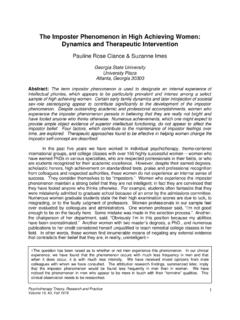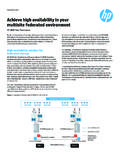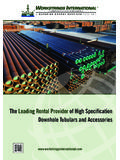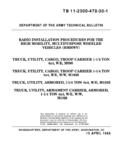Transcription of The Imposter Phenomenon in High Achieving …
1 The Imposter Phenomenon in high Achieving women : Dynamics and Therapeutic Intervention Pauline Rose Clance & Suzanne Imes Georgia State University University Plaza Atlanta, Georgia 30303. Abstract: The term impostor Phenomenon is used to designate an internal experience of intellectual phonies, which appears to be particularly prevalent and intense among a select sample of high Achieving women . Certain early family dynamics and later introjection of societal sex-role stereotyping appear to contribute significantly to the development of the impostor Phenomenon . Despite outstanding academic and professional accomplishments, women who experience the Imposter Phenomenon persists in believing that they are really not bright and have fooled anyone who thinks otherwise. Numerous achievements, which one might expect to provide ample object evidence of superior intellectual functioning, do not appear to affect the impostor belief.
2 Four factors, which contribute to the maintenance of impostor feelings over time, are explored. Therapeutic approaches found to be effective in helping women change the impostor self-concept are described. In the past five years we have worked in individual psychotherapy, theme-centered international groups, and college classes with over 150 highly successful women -- women who have earned PhDs in various specialties, who are respected professionals in their fields, or who are students recognized for their academic excellence. However, despite their earned degrees, scholastic honors, high achievement on standardized tests, praise and professional recognition from colleagues and respected authorities, these women do not experience an internal sense of success. They consider themselves to be impostors. women who experience the impostor Phenomenon maintain a strong belief that they are not intelligent; in fact they are convinced that they have fooled anyone who thinks otherwise.
3 For example, students often fantasize that they were mistakenly admitted to graduate school because of an error by the admissions committee. Numerous women graduate students state the their high examination scores are due to luck, to misgrading, or to the faulty judgment of professors. women professionals in our sample feel over evaluated by colleagues and administrators. One women professor said, I'm not good enough to be on the faculty here. Some mistake was made in the selection process. Another, the chairperson of her department, said, Obviously I'm in this position because my abilities have been overestimated. Another women with two master's degrees, a PhD., and numerous publications to her credit considered herself unqualified to teach remedial college classes in her field. In other words, these women find innumerable means of negating any external evidence that contradicts their belief that they are, in reality, unintelligent.
4 The question has been raised as to whether or not men experience this Phenomenon . In our clinical experience, we have found that the Phenomenon occurs with much less frequency in men and that when it does occur, it is with much less intensity. We have received mixed opinions from male colleagues with whom we have consulted. The attribution research findings, summarized later, imply that the impostor Phenomenon would be found less frequently in men than in women . We have noticed the Phenomenon in men who appear to be more in touch with their feminine qualities. This clinical observation needs to be researched. Psychotherapy Theory, Research and Practice 1. Volume 15, #3, Fall 1978. Self-declared impostors fear that eventually some significant person will discover that they are indeed intellectual impostors. One women stated, I was convinced that I would be discovered as a phony when I took my comprehensive doctoral examination.
5 I thought the final test had come. In one way, I was somewhat relieved at this prospect because the pretense would finally be over. I was shocked when my chairman told me that my answers were excellent and that my paper was one of the best he had seen in his entire career.. women who exhibit the impostor Phenomenon do not fall into any one diagnostic category. The clinical symptoms most frequently reported are generalized anxiety, lack of self- confidence, depression, and frustration related to inability to meet self-imposed standards of achievement. Included in our sample have been 95 undergraduate women and 10 Ph D faculty women at a small academically acclaimed private Midwestern co-educational college; 15. undergraduates, 20 graduate students, and 10 faculty members at a large southern urban university; six medical students from northern and southern universities; and 22 professional women in such fields as law, anthropology, nursing, counseling, religious education, social work, occupational therapy, and teaching.
6 They were primarily white middle- to upper-class women between the ages of 20 and 45. Approximately one-third were therapy clients with specific presenting problems (other than the impostor problem); the other two-thirds were in growth-oriented interaction groups or classes taught by the authors. While our focus has been on understanding the more personal, experiential effects of the impostor feelings, we find confirmation of our observations in the experimental findings of attribution theorists, who in recent years have begun to study differential attribution of success by men and women . In her review of the research on sex differences in the attribution process, Deaux (1976) points to considerable evidence that women consistently have lower expectancies than men of their ability to perform successfully on a wide variety of tasks.
7 The findings of the research citied by Deaux are consistent with the following principals: 1) An unexpected performance outcome will be attributed to a temporary cause. 2) An expected performance outcome will be attributed to a stable cause. In line with their lower expectancies, women tend to attribute their successes to temporary causes, such as luck or effort, in contrast to men who are much more likely to attribute their successes to the internal, stable factor of ability. Conversely, women tend to explain failure with lack of ability, whereas men more often attribute failure to luck or task difficulty. Given the lower expectancies women have for their own (and other women 's) performances, they have apparently internalized into a self-stereotype the societal sex-role stereotype that they are not considered competent (see Broverman, et al.
8 , 1972; Rosenkrantz, et al., 1968). Since success for women is contraindicated by societal expectations and their own internalized self-evaluations, it is not surprising that women in our sample need to find explanation for their accomplishments other than their own intelligence -- such as fooling other people. Thus, unlike men, who tend to own success as attributable to a quality inherent in themselves, women are more likely either to project the cause of success outward to an external cause (luck) or to a temporary internal quality (effort) that they do not equate with inherent ability. Deaux suggests that "If an unexpected event is attributed to some temporary factor, then future expectancies may remain unchanged, producing a self-perpetuating cycle.". She further proposes, however, that repeated success experiences over a period of time should begin to change one's expectancies.
9 We have been amazed at the self-perpetuating nature of the impostor Phenomenon -- with the pervasiveness and longevity of the impostor feelings of our high Achieving women , with their continual discounting of their own abilities and persistent Psychotherapy Theory, Research and Practice 2. Volume 15, #3, Fall 1978. fear of failure. We have not found repeated successes alone sufficient to break the cycle. Additional factors that appear to strengthen the maintenance of the impostor Phenomenon are discussed in the following section. Origin, Dynamics and Maintenance Why do so many bright women , despite consistent and impressive evidence to the contrary, continue to see themselves as impostors who pretend to be bright but who really are not? What are the origins and dynamics of such a belief and what functions could be served by holding on to such a belief?
10 We have observed that our "impostors" typically fall into one of two groups, with respect to early family history. In one group are women who have a sibling or close relative who have been designated as the "intelligent" member of the family. Each of the women , on the other hand, has been told directly or indirectly that she is the "sensitive" or socially adept one in the family. The implication from immediate and/or extended family members is that she can never prove that she is as bright as her siblings regardless of what she actually accomplishes intellectually. One part of her believes the family myth; another part wants to disprove it. School gives her an opportunity to try to prove it to her family and herself that she is bright. She succeeds in obtaining outstanding grades, academic honors, and acclaim from teachers.











